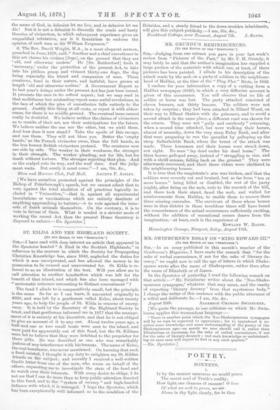MR. GRITNDY'S REMINISCENCES.
(TO THE EDITOR OF THE SPECTATOR.") Sin,—Judgiug from one extract you gave in your last week's review from "Pictures of the Past," by Mr. F. H. Grundy, it may fairly be said that the author's imagination has supplied a large portion of the materials with which one, at least, of these pictures has been painted. I allude to his description of the attack made by the mob on a party of soldiers in the neighbour. hood of Halifax, at the time of the "Plug Plot" Riots, in 1842.
I enclose for your information a copy of a cutting from a Halifax newspaper (1842), in which a very differe-nt account is given of this occurrence. You will observe that no life of soldier or horse was lost. The party attacked consisted of eleven hussars, not thirty lancers. The soldiers were not taken by surprise ; they had been attacked in Elland Wood, on their way to Elland Station with the prisoners, and to avoid a second attack in the same place, a different road was chosen for the return. They were not "gaily and carelessly" returning, when a second time attacked, but were walking their horses, almost of necessity, down the very steep Exley Bank, and after that were preparing to run the gauntlet by galloping up the steep Salterhebble Bank, where the brunt of the attack was made. Three horsemen and. their horses were struck down, not eight. No man "lay dead under his dead horse." The three horses galloped away, instead of "struggling to rise, and. with a shrill scream, falling back on the ground." They were afterwards recovered, and their three riders were sheltered in the neighbouring houses.
It is true that the magistrate's arm was broken, annhat the soldiers were severely cut and bruised, but so far from "ten or more horses" being killed or disabled, the rest of the party (eight), after firing on the mob, rode to the summit of the hill, and there took their stand, faced the mob, and waited for reinforcements from Halifax, to enable them to recover their three missing comrades. The survivors of those whose homes were in that district in those troublous times will have found the remembrance of the actual occurrences sufficiently exciting, without the addition of sensational scenes drawn from the imagination,—at least, such is the experience of ROWLAND W. RALrII.
Honnington Grange, Newport, Salop, August 13th.


































 Previous page
Previous page